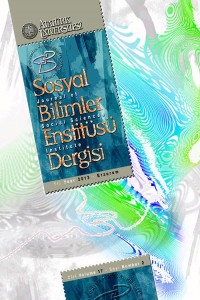Alternatives in Only Drunks and Children Tell the Truth / Sadece Sarhoşlar ve Çocuklar Doğruyu Söyler’deki Alternatif Yollar
Abstract
In the Eurocentric tradition, there are four worlds: First World, Second World, Third World and Fourth World which refer to, respectively, Britain, USA, and Europe; the white populations of Canada, Australia and New Zealand; developing nations in Asia, South America, North Africa; and indigenous populations subjugated, colonized and governed today by the white settlers such as Native Americans. In the play Only Drunks and Children Tell the Truth written by Drew Hayden Taylor, a Native girl, Grace, adopted by a White family, is asked by her birth sister to return to the Reservation for their mother’s funeral. Scared of opening old wounds, Grace refuses to visit the Reserve and her family but her sister, Barb, who has been left behind trying to compete with the memory of her sister who has managed to achieve a level of perfection only possible in the imagination is unwilling to let go of her resentment particularly given that their mother has since passed away. The double visions/double consciousness of these two sisters are juxtaposed in the languages of English and Ojibway. The feeling of being caught between two cultures and two languages leads Janice/Grace to suffer from the trauma of the displacement, which Homi Bhabha refers as unhomeliness. To be unhomed means to feel not at home even in your own home because you are not at home yourself: your cultural identity crisis has made you a psychological refugee. The purpose of the article is to tackle the identity crisis of the Ojibway nation and to dwell upon the alternative solutions brought in the play.
Keywords
References
- Allen, P. G. (1989). Spiderwoman’s granddaughters. Boston: Beacon Press.
- Bradley, H. (1996). Fractured Identities. Cambridge: Polity.
- Bruchac, J. (1987). Survival this way. Tucson: University of Arizona Pres.
- Berner, R. (1999). Defining American Indian Literature. NY: The Edwin Mellen Press. Cornell,S., Hartmann, D. (1998). Ethnicity and Race. CA: Pine Forge Press.
- Gans, H. (1979). Symbolic Ethnicity. Ethnic and Racial Studies, 2(1),1-20.
- Hall, S. (1990). Cultural Identity and Diaspora. In Jonathan Rutherford (ed) Identity, Community, Cultural Difference. London: Lawrence and Wishart.
- Song, M. (2003). Choosing Ethnic Identity. Oxford: Blackwell.
- Swann, B., Krupat, A. (1987). I tell you now. Autobiographical essays by Native American Writers. Lincoln: University of Nebraska Press.
- Swidler, A. (1986). Culture in action. American Sociological Review, 51, 273-286.
- Thomas, C. (2004). Native Wit. http://www.straight.com/article/native-wit (retrieved on 2010)
- Taylor, D. H. (1995). Only Drunks and Children Tell the Truth. American Antology, 200
- Young, J.C. R. (1995). Colonial Desire. NY: Routledge.
Alternatives in Only Drunks and Children Tell the Truth / Sadece Sarhoşlar ve Çocuklar Doğruyu Söyler’deki Alternatif Yollar
Abstract
Eurocentrik gelenekte, dört dünya vardır: İngiltere, ABD ve Avrupa ülkelerinden oluşan 1. Dünya; Kanada, Avustralya ve Yeni Zelanda’nin beyazlarından oluşan 2. Dünya; Asya, Kuzey Afrika ve Güney Amerika gibi gelişmekte oluşan ülkelerden olusan 3. Dünya ve kolonileşmiş gruplardan oluşan 4. Dünya. Drew Hayden Taylor’ın yazdığı ve 4. dünyaya ait olan Only Drunks and Children Tell the Truth beyazlar tarafından evlat edinilen Grace ile yerli Ojibway kabilesinde büyüyen Barb arasındaki kardeşlik ilişkilerini ve kimlik konusundaki travmalarını içermektedir. Her iki kardeşin de yaşamış olduğu nereye ait olma ama özellikle Barb in beyaz dünya ile biyolojik ailesi arasındaki çatışması ve çözüm yollarını irdeleyen oyun, Homi Bhabha’nın barksızlık kavramıyla makalede açıklanmaya çalışılmıştır. Makalenin amacı Ojibway kabilesindeki kimlik arayışı ve Taylor’ın getirdiği alternatif çözümler üzerinedir.
Keywords
References
- Allen, P. G. (1989). Spiderwoman’s granddaughters. Boston: Beacon Press.
- Bradley, H. (1996). Fractured Identities. Cambridge: Polity.
- Bruchac, J. (1987). Survival this way. Tucson: University of Arizona Pres.
- Berner, R. (1999). Defining American Indian Literature. NY: The Edwin Mellen Press. Cornell,S., Hartmann, D. (1998). Ethnicity and Race. CA: Pine Forge Press.
- Gans, H. (1979). Symbolic Ethnicity. Ethnic and Racial Studies, 2(1),1-20.
- Hall, S. (1990). Cultural Identity and Diaspora. In Jonathan Rutherford (ed) Identity, Community, Cultural Difference. London: Lawrence and Wishart.
- Song, M. (2003). Choosing Ethnic Identity. Oxford: Blackwell.
- Swann, B., Krupat, A. (1987). I tell you now. Autobiographical essays by Native American Writers. Lincoln: University of Nebraska Press.
- Swidler, A. (1986). Culture in action. American Sociological Review, 51, 273-286.
- Thomas, C. (2004). Native Wit. http://www.straight.com/article/native-wit (retrieved on 2010)
- Taylor, D. H. (1995). Only Drunks and Children Tell the Truth. American Antology, 200
- Young, J.C. R. (1995). Colonial Desire. NY: Routledge.
Details
| Primary Language | en;tr |
|---|---|
| Journal Section | Makaleler |
| Authors | |
| Publication Date | January 3, 2014 |
| Published in Issue | Year 2013 Volume: 17 Issue: 2 |

